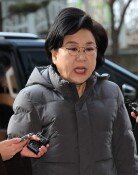Prime Minister Lee: Stiff or Audacious?
Prime Minister Lee: Stiff or Audacious?
Posted February. 17, 2005 22:43,
Evaluations of Prime Minister Lee Hae-chan go from one extreme to another, which is not common among politicians. He gets both evaluations: He is a man of excellent ability and criticism: He has a bad temper. He took the lead in creating the atmosphere of the strong administration and the weak legislature in the interpellation session on the government in the special session of the National Assembly with aggressive remarks that straightforwardly expressed his conviction. By so doing, he was subjected to gossip.
An Authoritative Prime Minister-
The attitude with which the prime minister answered questions in the interpellation session on the government ran the risk of fueling controversies. On February 16, He threw cold water on the atmosphere inside the main conference hall of the National Assembly by saying, Im taking a note as to how deep your understanding of national policy is and whether or not your questions are just based on collections of news articles, carefully listening to your (lawmakers) questionnaires. The Grand National Party immediately criticized, saying that it is tantamount to an arrogant idea that he would grade lawmakers.
The prime minister also firmly and briefly answered, I clearly tell you that such a thing never happened, when Uri lawmaker Kim Jong-ryul asked him about abolition of the limit system on the amount of investment. When Joo Seung-yong, another Uri lawmaker, demanded an explanation about the prime ministers negative remarks on a high-speed railway in Honam area, the prime minister raised his voice, saying, I didnt mean it. Dont try to distort my words.
Perhaps mindful of the advice of Uri Party executives that his attitude is too stiff when making a remark, he seemed to take a low-key attitude on February 17, frequently saying, I absolutely agree with what you said. It is an entire change from the three days of authoritative posture he showed before.
But He is Capable?-
It is hard to find previous prime ministers evasive low-key attitude or diplomatic remarks like Ill carefully deliberate on that, or Ill deeply bear it in my mind in Prime Minister Lees attitude. He creates tensions by clearly answering specific issues and immediately refuting when he thinks that something is not reasonable. Some say that such an attitude is based on his unique ability of comprehensive analysis, which enables him to deeply understand and streamline policy issues. A leading official at the Office of the Prime Minister said, I thought the Ministry of Finance and Economy is the strongest among government agencies in the past. But I recently feel proud of working for the Office of the Prime Minister when looking at the prime ministers ability to control state affairs.
Also, Prime Minister Lee never delays controversial policy issues. An official at the Office of the Prime Minister said, Former prime ministers tended to delay a decision on sensitive issues, saying we need to review this again later, but Prime Minister Lee makes a decision on those issues even if the decision invites criticism.
However, there is also much concern over his aggressiveness. Some point out, A prime minister who should take the lead in bringing about national unity is being the source of confrontation and conflict.
The Source of Prime Minister Lees Power-
Lee Hae-chans power basically comes from the trust of President Roh Moo-hyun. The prime minister meets with the president informally at least once a week. Therefore, he better understands what is on the presidents mind than anyone else.
In effect, he did exactly what the president wanted by calling the opposition GNP as a Chategi Party, meaning a political party which took bribes by the truckload, seeing lawmakers as his equals and straightforwardly criticizing the media. President Roh praised the prime minister in a senior aide meeting late last year, saying, Im quite quick to grasp the situation, but the Prime Minister seems quicker than me.
Furthermore, the prime minister shares various information with Chung Wa Dae on an equal footing. The National Intelligence Service and the National Security Council frequently submit written reports to him.
However, some in the ruling camp tend to check a powerful prime minister. Regarding the issue of appointment of Lee Ki-joon as deputy prime minister of education, there were words emanating from Chung Wa Dae that it was the prime minister who recommended him. This also reflected such a sensitive atmosphere. An official of the ruling camp said, The prime minister did ease the political burden of code one (president) by decentralizing authority in dealing with state affairs. But he should not overstep his boundaries as the Number Two.
Young-Chan Yoon yyc11@donga.com yongari@donga.com







